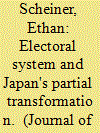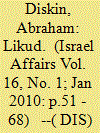| Srl | Item |
| 1 |
ID:
117075


|
|
|
|
|
| Publication |
2012.
|
| Summary/Abstract |
Japan's electoral system, which emphasizes first-past-the-post, single-member district rules, has led the country's party system to become consolidated around the Liberal Democratic Party (LDP) and Democratic Party of Japan (DPJ). At the same time, Japan's electoral rules also made it likely that the two parties would not differ markedly in their policy positions, as well as hinder the emergence of new partisan alignments that could offer more clearly distinct policy options. Put differently, Japan's electoral rules have encouraged the development of what is essentially a two-party system, but one in which party alternation in power need not produce sharp policy change.
|
|
|
|
|
|
|
|
|
|
|
|
|
|
|
|
| 2 |
ID:
093898


|
|
|
|
|
| Publication |
2010.
|
| Summary/Abstract |
In 1957 Downs claimed that most voters tend to hold centrist views. Hence, political parties should adopt centrist stands in order to attract as many voters as possible. Another aspect of the 'political centre' derives from prominent theories on coalition formation: the political party that captures the 'median' position in the parliament enjoys a tremendous advantage. The battle over the control of 'the centre' played a major role in the strategy of Likud in the 2009 Knesset elections, and in its ability to form a coalition following the elections. Although Kadima won one more seat than Likud, it lost the battle on the centre. Netanyahu, loyal to his centrist tendencies during the campaign, preferred to have only a segment of Labour in his coalition, at the cost of five ministerial posts, rather than to enjoy the support of the radical National Union at the cost of a single ministerial post.
|
|
|
|
|
|
|
|
|
|
|
|
|
|
|
|